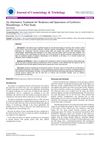January 2020 in “Hair therapy & transplantation” FUE is a modern hair transplant method that avoids large scars and is good for short hair.
January 2020 in “Hair therapy & transplantation” Healthy hair and scalp depend on overall body health.
 January 2019 in “Journal of cosmetology & trichology”
January 2019 in “Journal of cosmetology & trichology” L-Cystine and L-Cystine with Kera-Diet® safely improved hair and nail quality in healthy women.

Trichosol™ with Minoxidil can boost hair growth by 20%.
 October 2018 in “International journal of clinical & experimental dermatology”
October 2018 in “International journal of clinical & experimental dermatology” Baicapil was effective in reducing hair loss and increasing hair growth in women with telogen effluvium.
 July 2018 in “International journal of clinical & experimental dermatology”
July 2018 in “International journal of clinical & experimental dermatology” Eat a balanced diet for healthy hair; only use supplements if you have a proven nutrient deficiency.
January 2018 in “Hair therapy & transplantation” Hair health can indicate mental and general health.
 January 2018 in “Journal of general practice”
January 2018 in “Journal of general practice” Young people are losing hair due to stress, poor diet, pollution, and lack of sleep, but it can be treated with supplements and scalp treatments.
 January 2018 in “Journal of cosmetology & trichology”
January 2018 in “Journal of cosmetology & trichology” The Automatic Biofibre® Hair Implant is a fast and effective hair restoration method that provides immediate cosmetic benefits and good results in over 90% of cases, but requires proper care to avoid complications.
 January 2017 in “International journal of clinical & experimental dermatology”
January 2017 in “International journal of clinical & experimental dermatology” Eating a balanced diet with vitamins, micronutrients, and antioxidants is important for hair health and can help with hair loss.
 January 2017 in “Journal of clinical & experimental dermatology research”
January 2017 in “Journal of clinical & experimental dermatology research” The case shows skin changes can indicate deeper health issues like insulin resistance, which are challenging to manage.
 January 2017 in “Journal of clinical & experimental dermatology research”
January 2017 in “Journal of clinical & experimental dermatology research” Low ferritin levels might be linked to telogen effluvium, but vitamin D levels are not.
 January 2017 in “Clinical & medical biochemistry”
January 2017 in “Clinical & medical biochemistry” Certain gene variations in AKT2 are more common in women with PCOS and are linked to higher levels of specific hormones and symptoms.
 January 2017 in “Journal of cosmetology & trichology”
January 2017 in “Journal of cosmetology & trichology” A man with severe hair loss regrew hair after hormone treatment.
December 2016 in “Clinics in surgery” Understanding hair follicle biology and stem cell control can help develop treatments to stimulate hair growth for cosmetic procedures.

Off-label drug use can be risky but sometimes beneficial when standard treatments fail.
The document concludes that current hair loss treatments have limitations and suggests researching new treatments targeting different factors of hair loss.
 January 2015 in “Journal of clinical & experimental dermatology research”
January 2015 in “Journal of clinical & experimental dermatology research” A protein combining parathyroid hormone and collagen helped hair regrow in mice with a hair loss condition.
 January 2015 in “Journal of cosmetology & trichology”
January 2015 in “Journal of cosmetology & trichology” Mesotherapy might help make eyebrows thicker and darker for some people.
 December 2014 in “Research and Reviews: Journal of Pharmacology and Toxicological Studies”
December 2014 in “Research and Reviews: Journal of Pharmacology and Toxicological Studies” Cabbage extract in hair gel may promote hair growth and could help treat hair loss.
 January 2013 in “Anthropology”
January 2013 in “Anthropology” Untreated androgenetic alopecia leads to progressive hair loss in men.
 January 2012 in “Medizinisch Wissenschaftliche Verlagsgesellschaft eBooks”
January 2012 in “Medizinisch Wissenschaftliche Verlagsgesellschaft eBooks” The book provides a guide on men's health, covering both new and traditional issues, and emphasizes a multifaceted approach to understanding and addressing these problems.
 January 2012 in “Medizinisch Wissenschaftliche Verlagsgesellschaft eBooks”
January 2012 in “Medizinisch Wissenschaftliche Verlagsgesellschaft eBooks” The document is about male pattern baldness.
January 2012 in “Hair therapy & transplantation”  January 2021 in “Journal of cosmetology & trichology”
January 2021 in “Journal of cosmetology & trichology” The treatment improved hair growth and thickness in patients with hair loss, even 10 months after therapy without additional products.
January 2021 in “Journal of cosmetology & trichology” PRP therapy can be effective for early-stage common hair loss, with most patients seeing improvement, but there are inconsistencies in treatment methods.
January 2021 in “Hair therapy & transplantation” January 2020 in “Hair therapy & transplantation” PRP therapy can help stimulate natural hair growth and thicken hair.
Dutasteride and finasteride can change hair growth genes, helping treat hair loss.
Combining PRP with a special lotion is more effective for hair loss than PRP alone.


















